Leading Through Financial Crisis: What Leaders Must Do Under Scrutiny
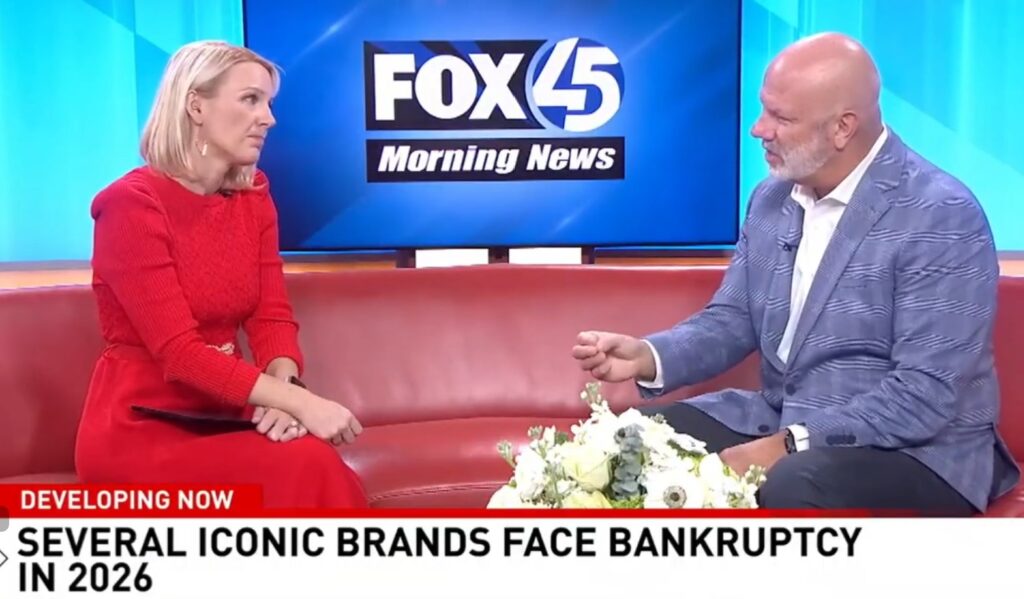
When financial stress becomes visible, leadership decisions are magnified. This short video highlights a few critical considerations leaders should keep in mind—especially when silence, panic, or mixed messaging can make things worse and employees, stakeholders, and the public are paying attention.
What the Verizon Outage and Recent Brand Failures Teach Us About Crisis Leadership

Over the past year, a growing list of well-known brands — including Saks Global, Rite Aid, Forever 21, and Marriott — have found themselves in the headlines for bankruptcy filings, operational breakdowns, or reputational backlash. While each situation looks different on the surface, they all point to the same underlying issue: crisis leadership failures that began long before the crisis became public – a dimmer switch versus the flick of a light switch. A timely example came up last week with the Verizon wireless outage, which disrupted calling, texting, and mobile data for customers across large parts of the U.S. Phones were pushed into “SOS” mode, and for hours, millions of people were left without reliable connectivity. While Verizon worked to restore service and later offered account credits, early communication was limited, forcing customers to rely on social media and outage trackers for answers. The outage itself was disruptive — but the leadership response shaped how customers perceived the event. It felt as if many were wondering this this was a technical issue or widespread cyber-attack. This highlights a critical distinction leaders often overlook: the difference between sudden crises and smoldering ones. Research consistently shows that roughly 70–75% of corporate crises are “smoldering” issues — problems leaders were aware of, or should have been aware of, but failed to address quickly enough. These slow-burn issues don’t grab attention at first, which makes them easier to ignore — until they explode into full-scale crises. The Verizon outage may feel sudden to customers, but system vulnerabilities, redundancy planning, and response protocols are all smoldering issues (or opportunities) that require leadership attention long before something breaks. The same pattern appears in recent bankruptcies. Saks Global’s collapse followed years of mounting debt and delayed decisions. Rite Aid’s repeated financial struggles reflect unresolved operational and legal pressures. Forever 21’s decline was driven by leadership waiting too long to adapt to shifting consumer behavior. Across industries, the lesson is clear: crises are rarely caused by a single bad day. They are the result of hesitation, overconfidence, and delayed action. Leaders often move quickly when faced with dramatic, visible emergencies — but move far too slowly when the warning signs are quieter. In Fallston Group’s experience, there are often many reasons for this, including the fact that hard decisions often lead to investor backlash, stock price hits, and layoffs. Not to mention an overreliance on brand longevity and perceived marketplace power. Strong crisis leadership isn’t about perfection. It’s about early recognition, transparent communication, and decisive action. Customers, employees, and stakeholders can tolerate disruption. What they won’t tolerate is silence, confusion, or the sense that leaders failed to act when they had the chance. Again, ‘If you don’t tell your story, someone else will.’ However, our mantra taken one step further, ‘If you don’t take action, someone else will.’ In today’s environment, where a single outage or headline can redefine a brand overnight, crisis leadership is no longer optional — it’s a core responsibility of anyone in charge.
Fallston Group “Ways In” on Waymo: Self-Driving Safety Issues Examined
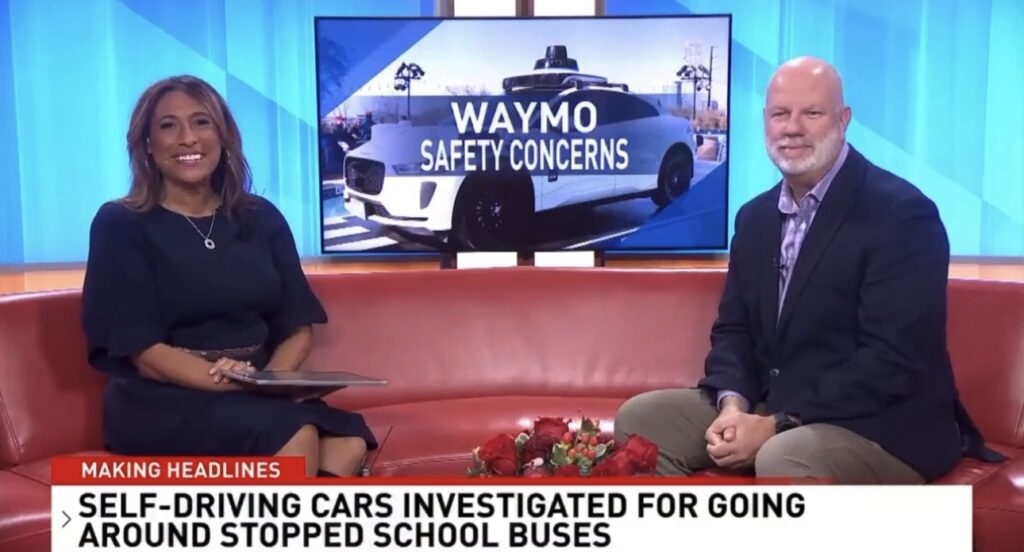
Waymo self-driving cars are in cities across the country and now they’re headed to Baltimore, but they’re being investigated for safety concerns. in Texas, they’ve been documented in twenty different incidents this school year of driving around school buses that had flashing red lights and the stop arm deployed. Now despite being asked to stop operations Waymo has declined, this morning we spoke with crisis management expert Rob Weinhold with Fallston Group to weigh in, take a look:
Protecting Customers This Holiday Season: A Call to Proactive Leadership

Embrace the Three P’s – Prevention, Presence & People As the holiday season begins, a time of larger crowds, heightened emotions, and rising expectations, destination leaders have a special responsibility: to make sure every guest feels safe, seen, and appreciated. Safety isn’t just a policy; it’s a commitment. And that commitment starts with leadership. Crisis leadership is not about reacting in chaos; it’s about preparing with purpose. Shopping centers and entertainment destinations should review and rehearse their emergency response plans now. Coordination with law enforcement, fire, and EMS isn’t optional, it’s essential. The more seamless these relationships are before a crisis, the more effective the response will be when seconds count. According to the National Retail Federation, more than 72% of retailers increased security measures during last year’s holiday season, and with good reason. The FBI reports that nearly 17% of active-shooter incidents occur in commercial areas. Working together, destination leadership and customers can collaborate to help ensure the desired levels of emotional and physical safety. Equally important is the power of presence and communication. A visible, professional security posture not only deters threats, it reassures guests. Clear signage, consistent messaging, and confident staff communication create a sense of calm in the midst of crowds. Every team member, from the ownership to general manager to staff, must understand how to identify and report suspicious behavior. Empowered employees are your first line of defense. The old adage is true, ‘If you see something, say something!’ Finally, the people! Lead with empathy. When an incident happens, the words and tone of leadership can either build or break public trust. Speak early, clearly, and compassionately. Demonstrate control but also care. The holiday season should be about connection and community, and those values must extend to how we protect our guests. Preparedness, presence, and people – three simple principles that define strong crisis leadership. When destination leaders embrace these pillars, they not only safeguard people; they preserve confidence, loyalty, and reputation. Remember, reputation leads to trust and trust leads to valuation, and not all currency is financial. At Fallston Group, we help organizations build, strengthen, and defend their reputations—before, during, and after a crisis. Please give us a call if you’d like to discuss this or any other topic further.
Protecting the Integrity of the Game: Enforcement, Prevention & Treatment
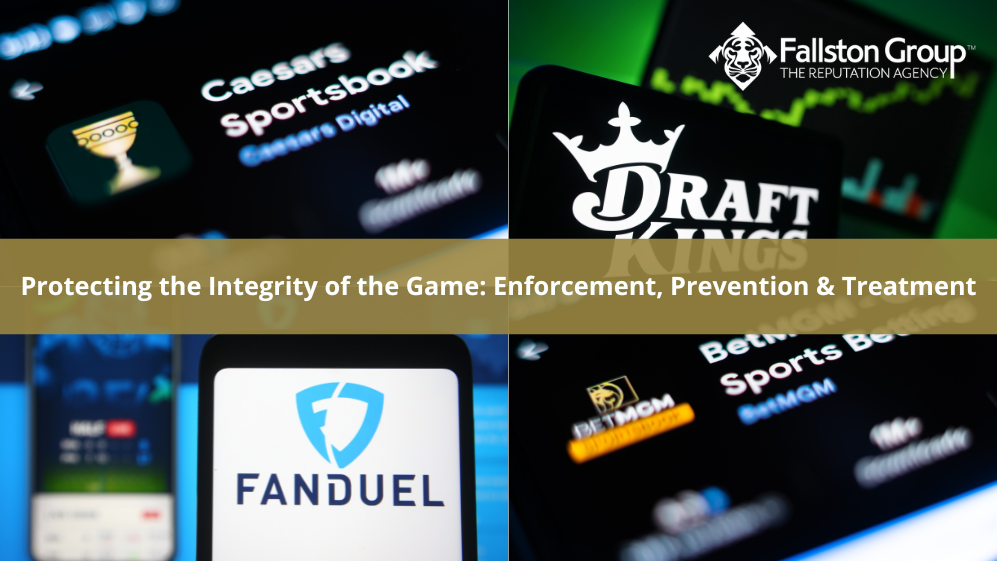
The integrity of competition is non-negotiable. The recent NBA betting scandal reminds us that when insider information, game manipulation, and gambling converge, trust in the sport collapses. Once that trust erodes, so does the credibility of the league, the athletes, and the fan experience itself. At Fallston Group, we see this not just as a sports issue, but as an institutional one. Gambling risks extend far beyond individuals placing bets — they test the resilience of entire organizations. That’s why leadership must own both prevention and response. The system must be designed to detect, investigate, and enforce consequences swiftly and transparently. Prevention begins with culture. Policies on paper mean little without education, accountability, and awareness. Every player, coach, and staff member should understand how gambling risk manifests — from subtle conversations about injuries to outright solicitation for insider information. Building an integrity-first mindset takes ongoing training, honest dialogue, and leadership that models ethical behavior daily. Treatment — in this context — isn’t just about punishment. It’s about rehabilitation, support, and restoring faith in the system. When missteps occur, the goal must be to rebuild both the individual and the institution’s credibility. The legalization and normalization of sports betting mean that organizations must adapt faster than ever. Proactive risk management, clear communication, and unwavering enforcement aren’t optional — they’re essential. Ultimately, fairness, transparency, and legitimacy are the lifeblood of competition. Fans deserve to know the game they love isn’t compromised. As I shared on FOX 45 Baltimore, it’s our collective responsibility to protect that integrity — through strong enforcement, thoughtful prevention, and meaningful treatment. Because without integrity, there is no game.
Rob Weinhold, CEO of Fallston Group, Shares Insight on FOX Following AWS Global Outage
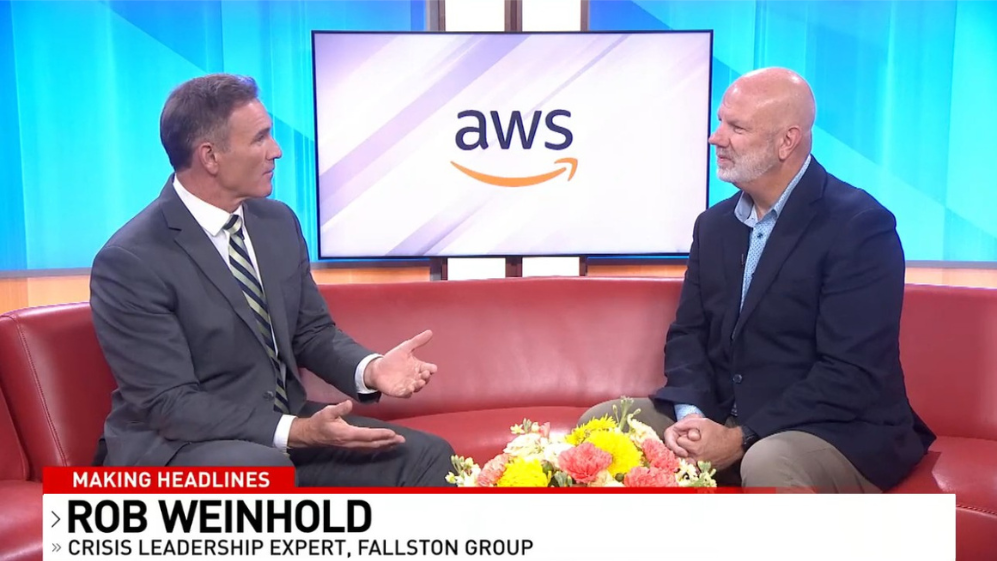
Watch interview on Fox: https://foxbaltimore.com/fox45-mornings/amazon-web-services-outage-causes-global-disruption-highlights-economic-reliance#
When the Cloud Breaks: Leadership Lessons from the AWS Outage
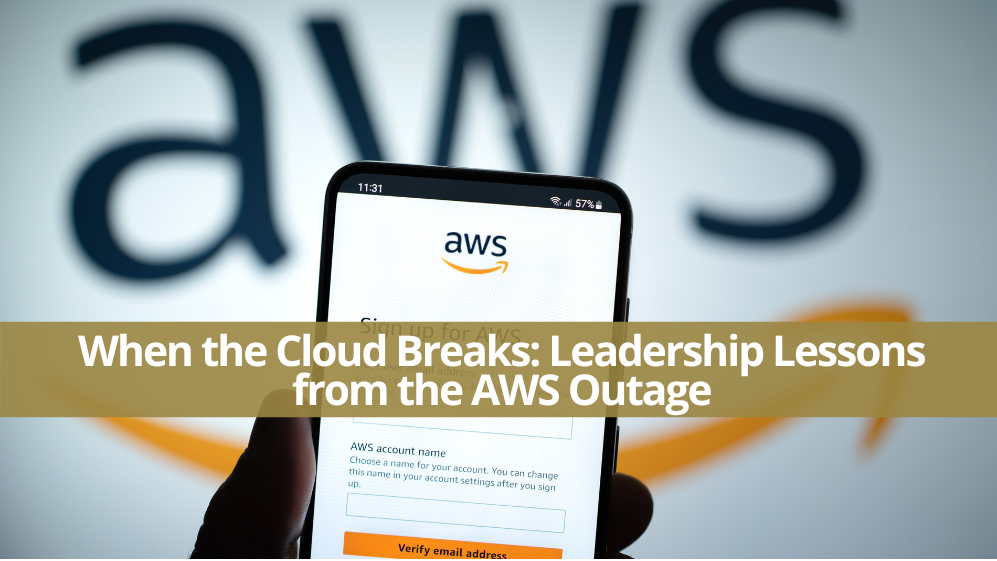
When the Cloud Breaks: Leadership Lessons from the AWS Outage During the early hours of October 20th, a major outage at Amazon Web Services (AWS) took hundreds of platforms offline and caused chaos for thousands of companies. Global brands like Snapchat, Venmo, Fortnite, Signal, and Ring were severely affected, along with UK institutions such as Lloyds Bank and HM Revenue & Customs. When the cloud goes down, the ripple effect hit with velocity and impact, and no organization is immune. Whether you are a global enterprise or a main street business, when your business continuity is disrupted, it can cost you time, money, customers, and careers. Moments like these separate reactive organizations from resilient ones. That’s why Fallston Group teaches the Resilient Moment Communications Model — a practical framework that guides leaders through the uncertainty of crisis. This model, developed by Dr. George Everly, provides a strategic communications path for leaders of every organizational shape and size. The Model suggests that if a leader answers the following five questions, at any stage of crisis, most questions that people have about an issue will have been answered: What happened? Be factual and transparent. AWS’s disruption apparently stemmed from an internal subsystem failure — not a cyber-attack. Clear early messaging prevents speculation from taking root. What caused it? Explain the root cause in plain language. Jargon confuses; clarity builds confidence. What are the effects? Acknowledge the human and business impact. From customer frustration to investor concern, empathy and accountability sustain trust. What is being done about it? Demonstrate decisive action. Communicate progress and solutions without over-promising. Precision and presence matter. What needs to be done in the future? Show learning and leadership. Strengthen systems, train teams, and rehearse responses before the next test. The AWS outage is a real-time reminder that resiliency is not just technical — it is organizational. As we say at Fallston Group, ‘you don’t spin your way through crisis; you lead your way through.’ Fallston Group helps leaders prepare for, navigate through, and recover from issues of sensitivity, adversity, and crisis — because reputation leads to trust, and trust leads to valuation. For more information, link to www.fallstongroup.com. – Rob Weinhold, Chief Executive of Fallston Group
The Silent Crisis: Violent Content on Digital Platforms Affecting Our Children
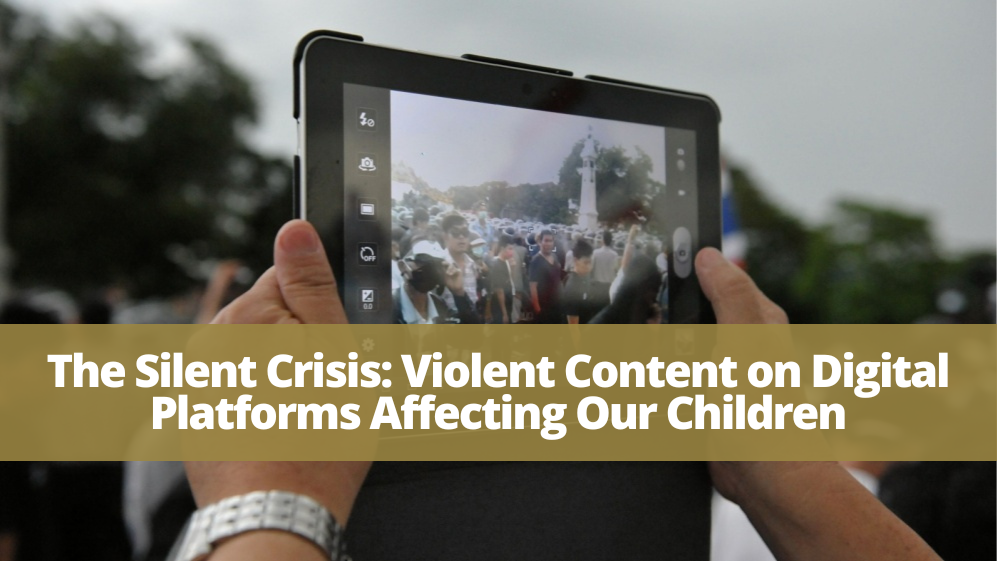
As a former Baltimore Police Officer, I have personally witnessed too many homicides, shootings, attempted murders, and horrific violent crimes during my time on the street. I’ve also, like all police officers across the country, helped many victims in the brutal aftermath. These experiences, which many would call overexposure, change the way you think, feel, and act. That said, this was the career I chose, and despite being exposed to the very worst of humanity, I also saw the very best along the way, sometimes within the same hour. These experiences typically involved ordinary people being thrust into extraordinary situations. As police officers, we were selected, trained, and often had one another to share the hardships, albeit traumatic by most standards. We were prepared for these lived experiences, but young people, through their digital experiences, are not. In our interconnected digital world, our youth are increasingly exposed to the harmful effects of social media, gaming, and other online platforms. Managing social media laws and oversight is an arduous, long-term effort, so we must focus on what we can control rather than what we cannot. Returning to a core principle I taught rookie officers: “You’re going to see some things out here you never imagined possible. Remember, the violence you see is going to happen whether you are here or not. Your job is to show up as the very best version of yourself to help people through life’s most difficult times, as a professional who is both safe and trusted by everyone you encounter.” Again, focus on what you can control. When Violence Goes Viral We live in an age where tragedy doesn’t just happen – it’s broadcast, shared, and replayed across every screen – the velocity of violence on our kids’ screens is unrelenting. Consider three recent events that shook communities and then ricocheted across the digital world: In Minneapolis, during a morning Mass at Annunciation Catholic Church & School, a shooter opened fire through stained-glass windows. Two children, just 8 and 10 years old, were killed, and at least 17 others were injured before the perpetrator died by suicide. This incident occurred during the first few weeks of the 2025 school year, sparking fear among parents, students, and the broader school community nationwide. In Charlotte, North Carolina, Iryna Zarutska, a 23-year-old Ukrainian refugee, was stabbed to death in an unprovoked attack while riding a light rail train. The video captured of this brutal crime evoked strong emotions and has been played tens of millions of times worldwide. And just one day later, political commentator Charlie Kirk, who had spoken out about Zarutska’s murder, was fatally shot at a public event in Utah. His assassination circulated on social platforms before many first responders arrived. Real-time, graphic violence that young people couldn’t help but witness on their devices, over and over. These events, tragic in their own right, became digital spectacles. Children and teens didn’t have to seek them out; the videos, headlines, commentary, and e-community conversations were pushed into feeds and group chats, often before families even had time to grieve. For young people, the question is not if they’ll see violence online, it’s when. And in my view, it changes you and them. The Research Is Clear The average child now spends 6 to 8 hours every day on screens for ‘entertainment’ alone, and that’s before counting schoolwork. Over this time, exposure to violence and harmful content is not the exception; I believe it’s become the norm. A U.S. national study of 6- to 17-year-olds found that 4+ hours of daily screen time (excluding schoolwork) is strongly associated with higher odds of anxiety, depression, ADHD, and behavioral problems, with sleep disruption playing a major role. A 2023 longitudinal study of adolescents showed that increases in social media use predicted higher rates of depressive symptoms a year later. In the UK, research found that teenagers who saw real-life violence on social media (fights, weapons, assaults) were more likely to feel unsafe in their own neighborhoods. Critically, most of this content wasn’t searched for; algorithms recommended it. A 2025 study of adolescents aged 12-18 found that intense gaming habits, particularly when they interrupted daily routines, were associated with more positive attitudes toward violence. Emotional regulation and frustration tolerance were crucial factors in whether these attitudes developed. Bottom line, the digital world can amplify violence, normalize aggression, and make children feel unsafe in ways that profoundly shape their mental health and worldview. It is up to all of us to maintain healthy boundaries. So, what now? What Parents Can Do This is not simply a technology issue; it is a leadership issue for every parent, grandparent, guardian, and anyone who gatekeeps the digital space for our young people. Here are five action steps that can make a difference: Talk Early and Often Bring up events proactively. When tragedies trend online, ask your kids what they saw and how it made them feel. Discuss the distinction between truth and rumor, while providing context. Give your children the space and grace to talk about how they are thinking, feeling, and acting. Set Boundaries that Stick Limit recreational screen time. Create no-screen zones (bedrooms, dinner table) and no-screen times (before bed). These simple habits reduce overexposure and improve sleep. See What They See Occasionally, co-view videos, co-play games, or scroll feeds together. You’ll better understand their digital reality, and they’ll know you’re credible when you talk about it. You’ll see what piques their interest, where they linger, and what content they quickly scroll by. Ask for their opinion and seek to understand. Build Resilience in Daily Life Encourage consistent sleep, physical activity, and offline hobbies. Emotional resilience and healthy routines act as buffers against harmful content. Model Behavior & Values Children learn more from what we do than what we say. Show them that you, too, set limits, avoid sensational content, and focus on healthier sources of information. Remember, young people watch your feet – words without embodiment result in lost
Can an Employer Fire an Employee for Offensive Social Media Posts? Featured Blog by Howard Kurman, Founder of Offit Kurman
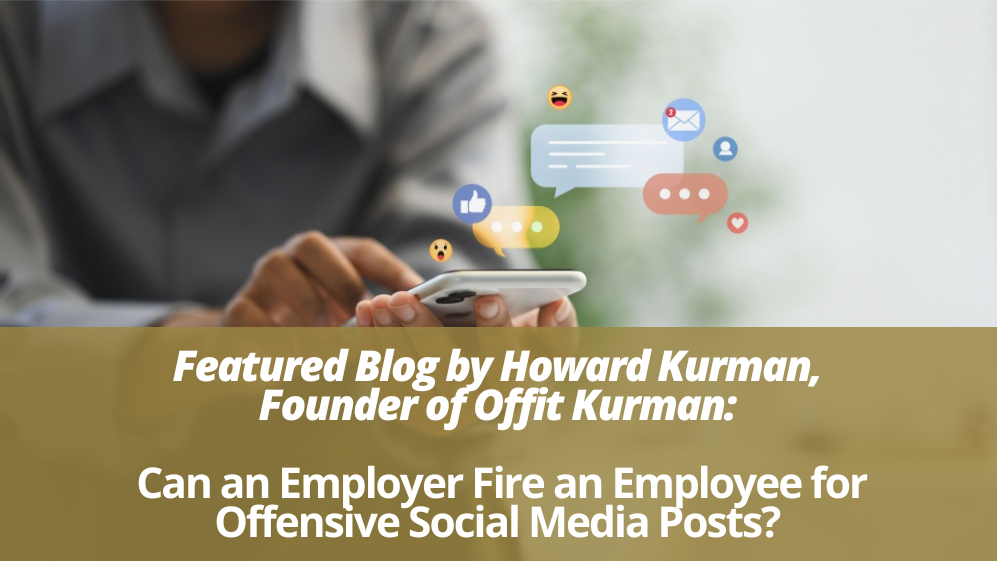
Can an Employer Fire an Employee for Offensive Social Media Posts? In an article in the September 16, 2025 edition of the Washington Post the lead paragraph read as follows: “The wave of companies and other institutions firing or suspending employees over what they’ve said in reaction to last week’s killing of conservative influencer Charlie Kirk has expanded in recent days, as some of his supporters in and outside the government amp up a push against speech they say crosses lines.” Thus, the question which arises in the minds of both employees and employers related to the voluminous publicity surrounding the recent Kirk assassination is whether an employee’s social media post which is deemed to be offensive can justify the potential termination of such employee. The short answer to this inquiry is that in the private sector, as opposed to the arena of public employment where first amendment protections may be applicable, employers have wide discretion to discipline and even fire employees for posts which are deemed to be unduly offensive, inflammatory, or violative of their cultural or internal policies. The caveat for private sector employers is that employees enjoy statutory protections under the National Labor Relations Act for speech of a political or social nature when such speech or posted comment is related to such employee’s workplace’s wages, hours or terms and conditions of employment. Furthermore, employees also enjoy protections under Title VII of the federal Civil Rights Act if, for instance, their social media posts protest discrimination in the workplace, when that alleged discrimination refers to any protected status, such as religion, national origin, race, disability, etc. Private employers would be well-advised in this incendiary political climate to analyze each situation based on the facts and circumstances of the post in question, and to evaluate whether such post is violative of its internal policies, is deemed to be overly inflammatory and/or offensive to a person(s), is disparaging or defamatory to the employer or its employees or customers, is damaging to the company’s reputation or cultivated image, or is deemed to be simply inconsistent with civilized and acceptable societal discourse. In any situation where termination may be predicated upon a social media post and where uncertainty may exist regarding potential legal exposure and/or a looming public relations crisis, it is always advisable for the employer to consult with competent employment counsel and/or a public relations crisis expert, like Fallston Group. Leadership extends beyond the workplace. For a broader look at how leaders can navigate the challenges of today’s digital world, read our companion blog: The Perils of Digital Exposure. Howard Kurman is a founder of Offit Kurman, a top 200 national law firm. He is a principal in the firm’s labor/employment practice and regularly counsels employers on all facets of employment and labor relations law and practice. To contact Howard he may be emailed at hkurman@offitkurman.com, or by phone at his office: 410-209-6417.
Crisis Leadership: The Hidden Catalyst for Growth
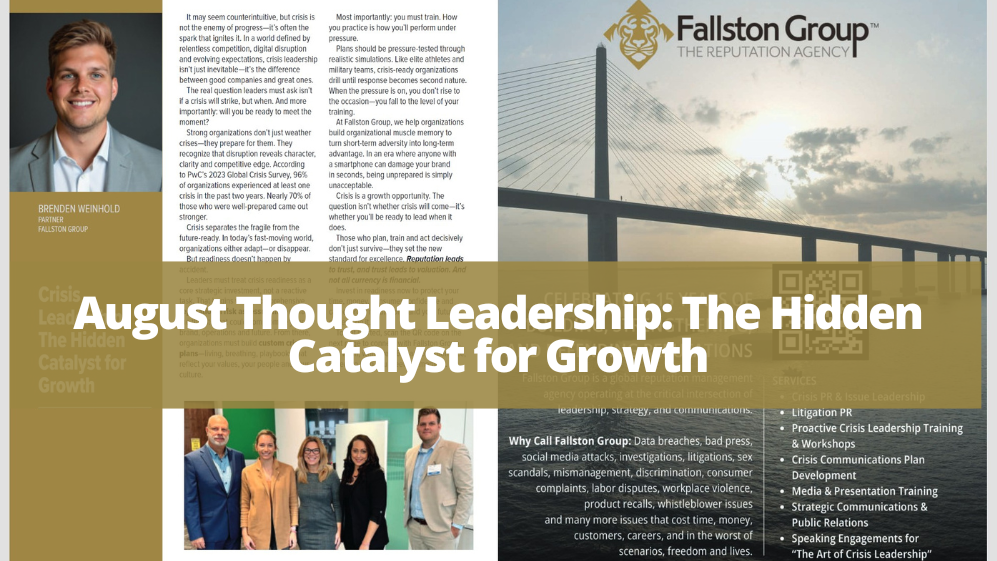
It may seem counterintuitive, but crisis is not the enemy of progress—it’s often the spark that ignites it. In a world defined by relentless competition, digital disruption, and evolving expectations, crisis leadership isn’t just inevitable—it’s the difference between good companies and great ones. The real question leaders must ask isn’t if crisis will strike, but when. And more importantly: will you be ready to meet the moment? Strong organizations don’t just weather crises—they prepare for them. They recognize that disruption reveals character, clarity, and competitive edge. According to PwC’s 2023 Global Crisis Survey, 96% of organizations experienced at least one crisis in the past two years. Nearly 70% of those who were well-prepared came out stronger. Crisis separates the fragile from the future ready. In today’s fast-moving world, organizations either adapt—or disappear. But readiness doesn’t happen by accident. Leaders must treat crisis readiness as a core strategic investment, not a reactive task. That begins with a comprehensive reputational risk assessment to surface the threats that could compromise your brand, operations, and future. From there, organizations must build custom crisis plans—living, breathing playbooks that reflect your values, your people, and your culture. Most importantly: you must train. How you practice is how you’ll perform under pressure. Plans should be pressure-tested through realistic simulations. Like elite athletes and military teams, crisis-ready organizations drill until response becomes second nature. When the pressure is on, you don’t rise to the occasion—you fall to the level of your training. At Fallston Group, we help organizations build organizational muscle memory to turn short-term adversity into long-term advantage. In an era where anyone with a smartphone can damage your brand in seconds, being unprepared is simply unacceptable. Crisis is a growth opportunity. The question isn’t whether crisis will come—it’s whether you’ll be ready to lead when it does. Those who plan, train, and act decisively don’t just survive—they set the new standard for excellence. Reputation leads to trust, and trust leads to valuation. And not all currency is financial. Invest in readiness now to protect your time, money, consumer confidence, and career. Your reputation—and your future—depend on it. To get started, visit https://fallstongroup.com/. Our team, with over 16 years of experience, is here to help you meet the moment.
